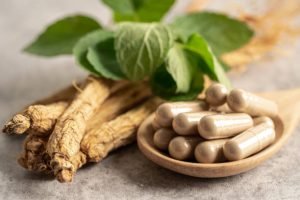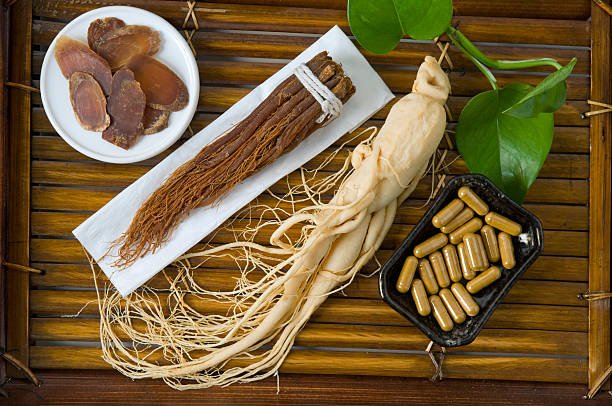For thousands of years, ginseng has been utilized in Chinese medicine. The term “ginseng” encompasses both American ginseng (Panax quinquefolius) and Asian or Korean ginseng (Panax ginseng), which share similar chemical compositions. However, Siberian ginseng, also known as Eleuthero (Eleutherococcus senticosus), is a distinct plant with different active components. The active ingredients in both Asian and American ginseng are believed to be ginsenosides.
Asian ginseng, like its American counterpart, is a twisted root resembling a human body with stringy shoots resembling arms and legs. In ancient times, herbalists believed that the appearance of ginseng indicated its ability to address a wide range of ailments, including fatigue, stress, asthma, and even cancer. In traditional Chinese medicine (TCM), ginseng is often combined with other herbs for enhanced therapeutic effects.

Asian ginseng has been used for centuries in traditional medicine for its potential health benefits. Here are some of the potential health benefits associated with Asian ginseng:
- 1. Boosts energy and reduces fatigue: Asian ginseng is often used as an adaptogen, which means it may help the body adapt to stress and increase energy levels. It is believed to enhance physical and mental performance, reduce fatigue, and improve overall stamina.
- 2. Enhances cognitive function: Asian ginseng may have cognitive-enhancing effects, including improved memory, focus, and mental clarity. It is believed to stimulate brain cells and improve cognitive function.
- 3. Supports immune system: Asian ginseng is thought to have immune-boosting properties. It may help strengthen the immune system, making the body more resistant to infections and diseases.
- 4. Reduces stress and anxiety: Asian ginseng is often used as a natural remedy for stress and anxiety. It may help reduce the levels of stress hormones in the body and promote a sense of calmness and relaxation.
- 5. Improves sexual function: Asian ginseng has been traditionally used as an aphrodisiac and to improve sexual function in both men and women. It may help increase libido, improve erectile dysfunction, and enhance sexual performance.
- 6. Supports cardiovascular health: Asian ginseng may have cardiovascular benefits, including reducing blood pressure, improving blood circulation, and reducing the risk of heart disease.
It’s important to note that while Asian ginseng has a long history of use in traditional medicine, scientific research on its effectiveness and safety is still ongoing. It is always recommended to consult with a healthcare professional before starting any new herbal supplement.
Adding ginseng to your diet is easy and can be done in various ways. Here are some suggestions:
- 1. Raw or steamed: Ginseng root can be eaten raw or lightly steamed to soften it. Simply slice the root and consume it as is.
- 2. Ginseng tea: Stew ginseng slices in hot water to make a tea. Let it steep for several minutes before drinking.
- 3. In recipes: Add ginseng to soups, stir-fried dishes, or other recipes to incorporate its flavor and potential health benefits.
- 4. Extract forms: Ginseng extract is available in powder, tablet, capsule, and oil forms. Choose a standard extract that contains 2-3% total ginsenosides for optimal benefits.
When determining the dosage, consider the specific condition you want to improve. Generally, daily doses of 1-2 grams of raw ginseng root or 200-400 mg of extract are recommended. Start with lower doses and gradually increase over time.

To enhance absorption and maximize benefits, consume ginseng before meals. Remember to consult with a healthcare professional before adding any new supplement to your diet.
Ginseng, a popular herbal supplement in Chinese medicine, has been used for centuries and is known for its antioxidant and anti-inflammatory effects. It is believed to have various health benefits, including regulating blood sugar levels, potentially aiding in certain types of cancer, strengthening the immune system, enhancing brain function, reducing fatigue, and improving symptoms of erectile dysfunction.
There are different ways to incorporate ginseng into your diet. You can consume it raw or lightly steamed by slicing the root and eating it as is. Another option is to make ginseng tea by stewing ginseng slices in hot water and letting it steep before drinking. Additionally, you can add ginseng to soups, stir-fried dishes, or other recipes to enjoy its flavor and potential health benefits.
If you prefer a more convenient option, ginseng is also available in extract, capsule, or powder form as a dietary supplement. When choosing an extract, look for one that contains 2-3% total ginsenosides for optimal benefits.
It is important to consider the specific condition you want to improve when determining the dosage. Generally, daily doses of 1-2 grams of raw ginseng root or 200-400 mg of extract are recommended. It is advisable to start with lower doses and gradually increase over time.
To enhance absorption and maximize the benefits of ginseng, it is recommended to consume it before meals. However, it is always a good idea to consult with a healthcare professional before adding any new supplement to your diet.

